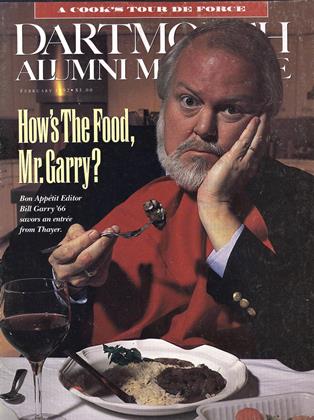A consensus has emerged among Dartmouth alumni, faculty, and students in at least one area: Freedman has made excellent administrative appointments and then given them free rein. They include:
ENGINEERING PROFESSOR JOHN W. Strohbehn—a researcher in microwaves to battle cancerous tumors—as provost. Strohbehn's main tasks so far have been to spearhead Dartmouth's planning, help set the goals for the capital campaign, and oversee increasingly austere budgets.
CARDIOLOGIST and former Duke Hospital head Andrew Wallace—as dean of the Medical School. He comes to the school just as it is being moved three miles off campus to a new $216 million medical complex.
HISTORY PROFESSOR JAMES Wright—as dean of faculty. Wright has injected a low-key, pragmatic style to the office and overseen a major study of the curriculum. Generally popular with his colleagues, he made an unpopular budget-saving attempt to lay off adjunct professors and require remaining faculty to teach five courses a year. The plan was abandoned.
FOUNDING HEAD Edward A. Fox of the federal lending agency Sallie Mae as dean of Amos Tuck. The business school comes off a successful $16.5 million campaign.
LEE PELTON—AS DEAN OF STUDENTS. The most recent top-level appointment, Pelton was the dean at Colgate, where he gained notoriety for his strict dealings with fraternities. He has made himself highly visible in his first weeks at the College, but students are anxious to see how he will deal with federal alcohol regulations and the unending problem of fraternities. In what diplomats would call a "confidence-building gesture," last November the dean moved rush back from sophomore winter to fall, a move that had been requested by the Student Assembly.
KARL FURSTEN berg—as director of admissions. The former admissions director at Wesleyan University, Fursten berg has updated admissions publications and beefed up on-campus visits and interviewing.
LYN HUTTON—AS VICE PRESIDENT and treasurer. Formerly at the University of Southern California, Hutton comes into a financial climate that is as challenging as the physical one. She has successfully countered claims that Dartmouth was overcharging the federal government in research contracts. Her biggest task is faced by her colleagues throughout higher education: to keep costs under control. The era of rapidly rising tuitions is over; Dartmouth's Trustees have committed the institution to bringing tuition increases closer to the higher-education price index: the collegiate inflation rate.
Freedman's decentralized management style makes these appointments more important than they were with past presidents. "Freedman is the face for a consort of managers," says Professor Pamela Crossley. Indeed, the president has proved to be a very hands-off manager. "You cannot attract and keep first-rate people unless you give them a good deal of responsibility and let them have the satisfaction of making the decisions and seeing the outcome of them," he says. Freedman cites the appointments of these people as one of his greatest accomplishments. "Your taste in human beings—in people," he says, "is revealed by the quality of the people you appoint, and I can say vaingloriously that I am very, very proud of the people that I have appointed here."
In fact, in the midst of rhetoric about Catullus and the cello, Freedman's most far-reaching change has involved the administrative structure of the College. He revamped the position of provost and appointed John Strohbehn. "The basic rationale, as I told the faculty, was that it is a mistake for an institution to have only one person responsible for thinking about the whole institution," he says. "You ought to have at least two, and the provost is the only other person whose portfolio is the entire institution." Strohbehn has freed up Freedman from many of the day-today aspects of the job and allowed him to do "the vision thing," in the words of one faculty member. "You do not want your president down in the trenches all the time," says Dean David Lindgren. In contrast, Freedman's predecessor often became bogged down by relatively routine affairs of the College. "David McLaughlin was called if a door was painted the wrong color," says Jere Daniell. "Freedman is to be congratulated for being inaccessible. That's the modern style of presidents."
 View Full Issue
View Full Issue
More From This Issue
-
 Feature
FeatureHitting His Stride
February 1992 By Charles Wheelan ’88 -
 Feature
FeatureThe Gentleman's B-Plus
February 1992 By Eric Konigsberg '91 -
 Feature
FeatureEat Here
February 1992 By CHRIS WALKER '92 and TIG TILLINGHAST '93 -
 Feature
FeatureThe Geriatric Adventure Society
February 1992 By Will Lange -
 Article
ArticleA Nation of Gentlemen
February 1992 By Professor Jeffrey Hart -
 Article
ArticleDr. Wheelock's Journal
February 1992 By "E. Wheelock"
Article
-
 Article
ArticleWITH THE BIG GREEN TEAMS
July 1960 -
 Article
ArticleGive a Rouse for
SEPTEMBER 1985 -
 Article
ArticleWomen in medicine at Dartmouth
APRIL 1986 -
 Article
ArticleWhat books have you read for pleasure in the last year?
February 1992 -
 Article
ArticleON RETIREMENT
JUNE 1964 By ALLEN R. FOLEY '20 -
 Article
ArticleFour College presidents,
JUNE 1973 By President McGill, Columbia

